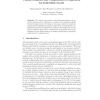Free Online Productivity Tools
i2Speak
i2Symbol
i2OCR
iTex2Img
iWeb2Print
iWeb2Shot
i2Type
iPdf2Split
iPdf2Merge
i2Bopomofo
i2Arabic
i2Style
i2Image
i2PDF
iLatex2Rtf
Sci2ools
133
Voted
SAGT
2015
Springer
2015
Springer
Characterization and Computation of Equilibria for Indivisible Goods
Abstract. We consider the problem of allocating indivisible goods using the leading notion of fairness in economics: the competitive equilibrium from equal incomes. Focusing on two major classes of valuations, namely perfect substitutes and perfect complements, we establish the computational properties of algorithms operating in this framework. For the class of valuations with perfect complements, our algorithm yields a surprisingly succinct characterization of instances that admit a competitive equilibrium from equal incomes.
Game Theory | SAGT 2015 |
Related Content
| Added | 17 Apr 2016 |
| Updated | 17 Apr 2016 |
| Type | Journal |
| Year | 2015 |
| Where | SAGT |
| Authors | Simina Brânzei, Hadi Hosseini, Peter Bro Miltersen |
Comments (0)

